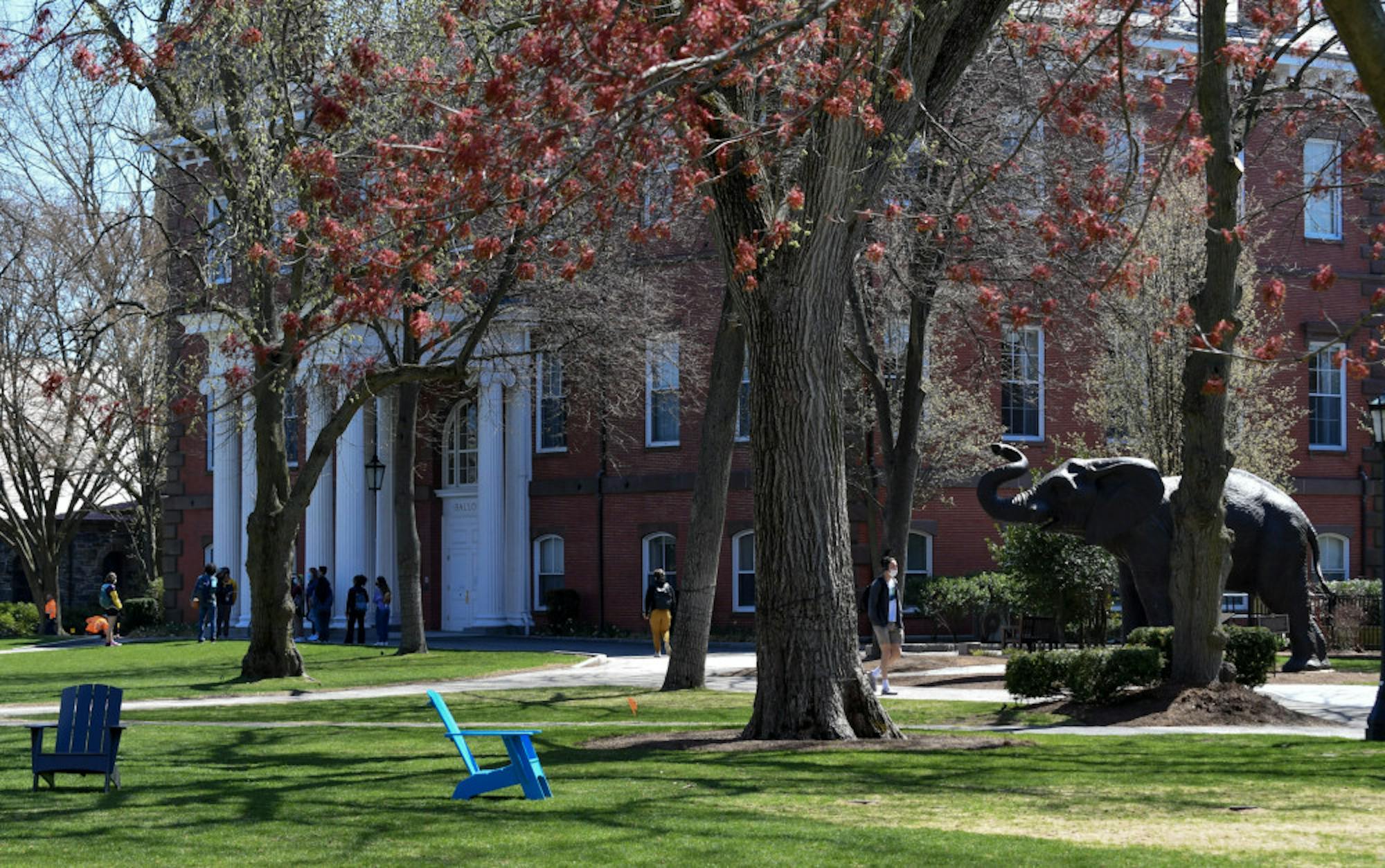In its final meeting of the academic year, the Tufts Community Union Senate passed resolutions and heard supplementary funding and capital expenditure requests. TCU Diversity Officer Mathew Peña, TCU Treasurer Sharif Hamidi and TCU President Sarah Wiener also delivered speeches to the Senate body.
TCU Senate began the meeting by voting on three resolutions.
The first resolution called on Tufts to make COVID-19 vaccinations accessible for all in-person community members in the fall 2021 semester. It was originally authored by Senators Ritesh Vidhun, Annika Witt, Ibrahim AlMuasher, Daniel Weber, Valerie Infante and Trenton DeBonis, but was amended significantly before being voted on in its final form.
The original text of the resolution contained a clause asking Tufts to mandate COVID-19 vaccinations for all in-person students in the fall, but several senators expressed concern that this would intensify existing racial inequities surrounding access to the vaccine, and that the language of a mandate would unfairly put pressure on students rather than the administration.
“Mandating things doesn't make them accessible … Tufts mandates so many things that are so inaccessible to first-gen low income students,” Latinx Community Senator Carolina Olea Lezama said.
The senators who submitted the resolution referenced a survey of 346 Tufts students who were asked whether they would support a vaccine mandate. Multiple senators pointed to survey data as an indicator of the inequity of mandating a vaccine.
"Looking at the breakdown [of the survey respondents] who identify as Black or African American, there's a lot of disagreement, especially compared to that of white students for the question, 'I would support Tufts mandating a COVID vaccine,'" TCU Senate Historian Sarah Tata said. "But then, there's a lot more support for the question, 'I would support Tufts making the vaccine available to all students,' which is why I think the focus should shift away from the mandate … and only focus on the accessibility portion of the resolution."
In its final form, which contained language on accessibility but removed the component calling for a mandate, the resolution passed with 15 senators voting in favor, one opposed and six abstaining.
The second resolution, which was introduced by students Matthew Alswanger, Ananda Kao, Kirsten Grazewski, Sarah Beatty, Dani Coates and Uzochi Oparaji, calls on Tufts to create an on-campus Wellness Center.
The center would offer mindfulness and wellness initiatives, spaces for students to relax and programming that specifically prioritizes the mental health of students of color.
Alswanger, who graduated in February, explained why he believes Tufts needs a Wellness Center.
“Having gone through mental health challenges personally during my time here at Tufts, I, like many of you, recognize the need for supplementary resources to therapy on campus," Alswanger said. "Not only is this concept scientifically proven from studies, but its success is unquestionable at our peer universities such as Columbia, Georgetown, Stanford, Duke and more.”
Executive Director of Health and Wellness Michelle Bowdler attended the meeting to answer questions from the senators about the resolution. She expressed her support for the idea behind it but said, “I know that we don't have the capacity to act on this immediately.”
The resolution passed with 23 senators voting in favor, none opposed and one abstaining.
The third resolution called on Tufts to increase student representation on the Board of Trustees by electing a faculty member to the Board’s executive committee. They would be a voting member, elected by students and tasked with representing student interests.
The resolution was authored by Trustee Representatives Ayden Crosby, Alex Lein, Veronica Stewart-Frommer and Jada Sullivan, along with Peña and Wiener.
Wiener, a senior, explained the importance of creating increased student representation on the Board of Trustees.
“The actual decisions ... that affect student life happen way, way above where [TCU Senate’s] decision-making power reaches, and until those actors are accountable to student interests … there’s nothing for donors, other stakeholders, administrators, Board of Trustees members, et cetera to gain from listening to student voices, so that's why we should put them on the Board," Wiener said.
The resolution passed with 26 senators voting in favor, none opposed and none abstaining.
TCU Senate then heard 14 supplementary funding requests.
Sketch comedy group Major: Undecided requested $81 to purchase club apparel. Eight members of the Allocations Board voted in favor of the request, with none opposed and none abstaining. The request passed TCU Senate by acclamation.
The Computer Science Exchange requested $600 to bring in two speakers for an event. Eight members of the Allocations Board voted in favor of the request, with none opposed and none abstaining. The request passed TCU Senate by acclamation.
The Bengali Students Association, a new student organization, requested $240 worth of funding for the remainder of the academic year. Eight members of the Allocations Board voted in favor of the request, with none opposed and none abstaining. The request passed TCU Senate by acclamation.
Tufts Student Garden requested $274 to purchase new fencing. Eight members of the Allocations Board voted in favor of the request, with none opposed and none abstaining. The request passed TCU Senate by acclamation.
Tufts Asian Student Coalition and Korean Students Association jointly requested $3,000 to host Alexander Chee, a writer and professor at Dartmouth College, for a virtual lecture and writing workshop. Seven members of the Allocations Board voted in favor of the request, with none opposed and one abstaining. The request passed TCU Senate by acclamation.
Tufts Maternal Advocacy and Research for Community Health requested $90 to purchase prizes for a virtual trivia night. Eight members of the Allocations Board voted in favor of the request, with none opposed and none abstaining. The request passed TCU Senate by acclamation.
180 Degrees Consulting requested $1,750 for club apparel. Eight members of the Allocations Board voted in favor of the request, with none opposed and none abstaining. The request passed TCU Senate by acclamation.
The Ethiopian Eritrean Students Association requested $380 for club apparel. Eight members of the Allocations Board voted in favor of the request, with none opposed and none abstaining. The request passed TCU Senate by acclamation.
Tufts Asian Student Coalition requested $1,000 to host the filmmaker Satsuki Ina in a virtual event. Seven members of the Allocations Board voted in favor of the request, with none opposed and one abstaining. The request passed TCU Senate by acclamation.
TEDxTufts requested $1,215 to purchase branded tablecloths and thank-you cards. Eight members of the Allocations Board voted in favor of the request, with none opposed and none abstaining. The request passed TCU Senate by acclamation.
Tufts Quiz Bowl requested $70 to pay a quiz bowl competition registration fee. Eight members of the Allocations Board voted in favor of the request, with none opposed and none abstaining. The request passed TCU Senate by acclamation.
The Muslim Students Association requested $1,000 to purchase graduation stoles for club members. Eight members of the Allocations Board voted in favor of the request, with none opposed and none abstaining. The request passed TCU Senate by acclamation.
Melisma Magazine requested $553 for club apparel. Eight members of the Allocations Board voted in favor of the request, with none opposed and none abstaining. The request passed TCU Senate by acclamation.
The Japanese Culture Club requested $3,000 to purchase traditional Japanese happi coats. Eight members of the Allocations Board voted in favor of the request, with none opposed and none abstaining. The request passed TCU Senate by acclamation.
TCU Senate then voted to spend part of its surplus accumulated from the 2009–19 fiscal years on capital expenditure requests from various student groups. They are often higher-cost items that help sustain an organization's operation for multiple years.
The Media Advocacy Board Lab and Tufts student publications received $9,400 to replace computers and printers and purchase a new table.
Tufts Mountain Club received $50,000 to repair and update the Loj.
The Sink received $12,000 to relieve a deficit incurred during the pandemic and purchase an ice machine.
Tufts Freeform Radio WMFO received $6,000 for studio equipment replacements and event speakers.
The Robotics Club received $10,000 to purchase a WAZER waterjet cutter, which cuts materials using high-pressure water.
Tufts University Social Collective received $14,400 to purchase camera equipment, a Jumbo mascot costume and other miscellaneous equipment.
Applejam received $1,000 for microphone stands, stage lights and speakers.
The Tufts Daily received $3,680 to purchase a desktop computer, two DSLR cameras and office equipment.
Peña, Hamidi and Wiener then delivered short speeches in which they looked back on their time as leaders of TCU Senate.
Peña, a senior, recognized the TCU community senators for their work during the past academic year.
"I really want to personally thank all of my community senators for always being there to defend the people who can't defend themselves," Peña said. "I still have yet to go to a Senate meeting where I haven't seen senators call out things that are supposed to be called out in the moment, and I do love and enjoy the people I work with every week."
Hamidi, a senior, spoke about the TCU Treasury’s accomplishments during his two years as treasurer and reflected on the makeup of the Allocations Board.
“This year’s [Allocations Board] is majority women for the second consecutive year and has the distinction of being mostly members of color," Hamidi said. "It's long overdue, but I'm optimistic that future Allocations Boards will continue to reflect the Tufts community we serve, demographically and substantively.”
He noted how the Treasury in general is doing.
"The state of the Treasury, I'm proud to say, is stronger than ever," Hamidi said.
In her speech, Wiener reflected on the past year’s highs and lows.
“This year we were tasked with creating a community and carrying out our duties on Zoom in a pandemic and in a global awakening to white supremacy,” she said. “I began the year with a goal of meeting adversity and uncertainty, a belief that each challenging decision was an opportunity, and sometimes, oftentimes, we failed in that endeavor but sometimes we succeeded … I believe we genuinely learned from and with each other throughout the year.”
Wiener also highlighted some of the Senate’s accomplishments from the past year, including its support of multiple resolutions focused on improving racial equity at Tufts, its role in advocating for the Exceptional Pass/Fail grading option and its Staycation programming.






